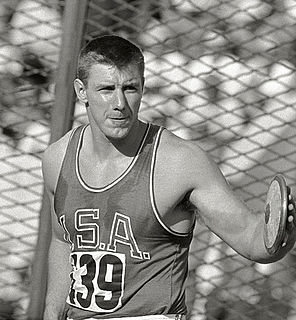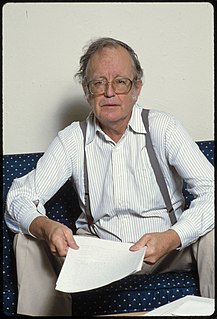A Quote by Al Oerter
Competition in its best form is a test of self. It has nothing to do with medals. The winner is the person who gets the most out of themselves.
Related Quotes
Those who have chosen the path of least resistance in life, who cannot bear to bring themselves to make a stern value-judgment in criticism of their own most intimate feelings, achieve what they deserve: not self-understanding but radical self-superficialization, not a discovered but a self-ascribed identity that explains nothing, reveals nothing, means nothing, and ultimately accomplishes nothing culturally or intellectually.
Some form of gnosis or immediacy is attached to all thinking as its root-form or primitive origination; every act of thinking has this passive derivation, this coming-into-being of thinking not out of nothing (as it likes to imagine) but out of some unthinkable something. But the most self-abstractivist or self-reductivist kind of thinking cannot tolerate even the notion (much less the traumatic experience or confrontation) of an incurable pathos, a weakness or blind-spot, within consciousness. The very idea is an insult to the autonomy or self-determinability of ego/will/reason.
A winner is someone who sets their goals, commits themselves to those goals and then pursues their goals with all the ability that is given to them. That requires someone who beleives in themselves, who will make self sacrifices, work hard, and maintain the determination to perform at the best of their ability.
It is a fallacy to think that carping is the strongest form of criticism: the important work begins after the artist's mistakes have been pointed out, and the reviewer can't put it off indefinitely with sneers, although some neophytes might be tempted to try: "When in doubt, stick out your tongue" is a safe rule that never cost one any readers. But there's nothing strong about it, and it has nothing to do with the real business of criticism, which is to do justice to the best work of one's time, so that nothing gets lost.
Arrogance is a killer, and wearing ambition on one's sleeve can have the same effect. There is a fine line between arrogance and self-confidence. Legitimate self-confidence is a winner. The true test of self-confidence is the courage to be open - to welcome change and new ideas regardless of their source. Self-confident people aren't afraid to have their views challenged. They relish the intellectual combat that enriches ideas.
You've got to realize that in any competition there is always a winner and loser. When it turns out that you're the loser on a given day, you can be a graceful loser, but it doesn't mean that you're a loser in the sense that you're willing to accept losses readily. Concede that on that day you weren't the best and that you were beaten in competition. But that should make you more dedicated and hard working. It's wrong to accept defeat as a loser. Be graceful about losing, but don't accept it.
Scholars, who pride themselves on speaking their minds, often engage in a form of self-censorship which is called "realism." To be "realistic" in dealing with a problem is to work only among the alternatives which the most powerful in society put forth. It is as if we are all confined to a, b, c, or d in the multiple choice test, when we know there is another possible answer. American society, although it has more freedom of expression than most societies in the world, thus sets limits beyond which respectable people are not supposed to think or speak.



































